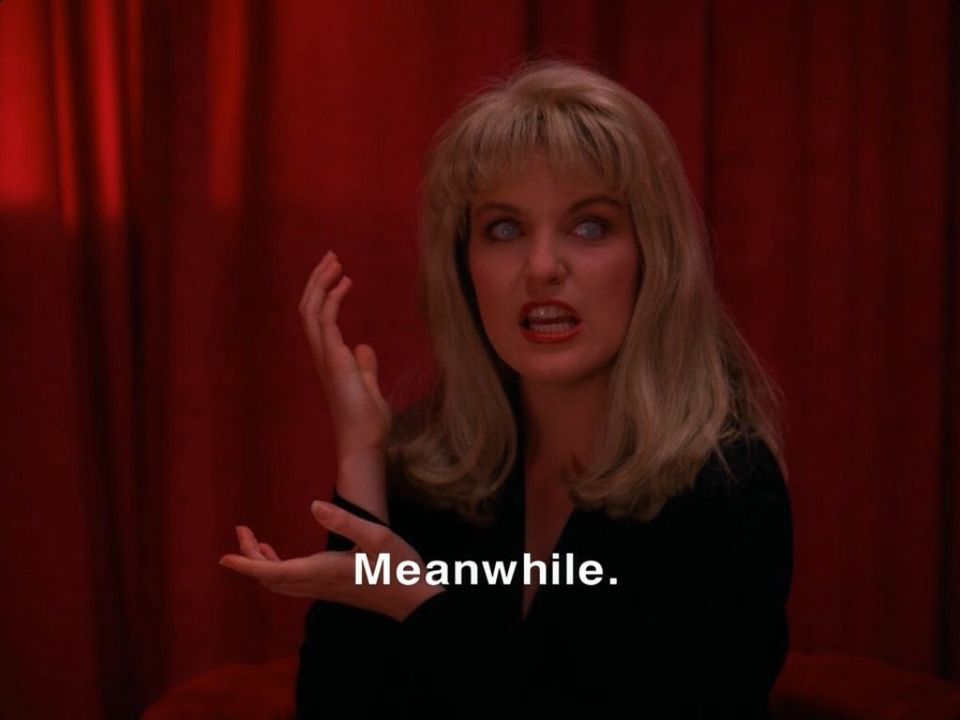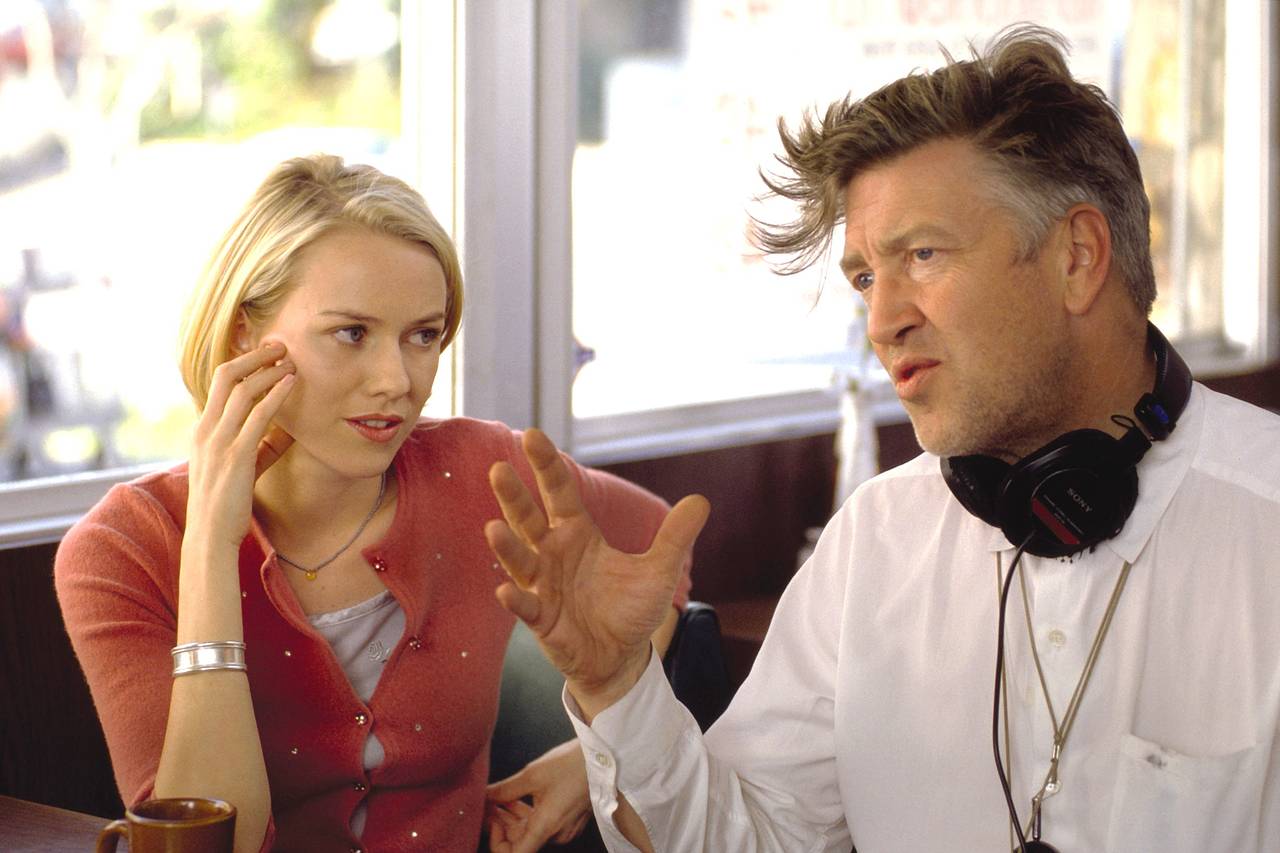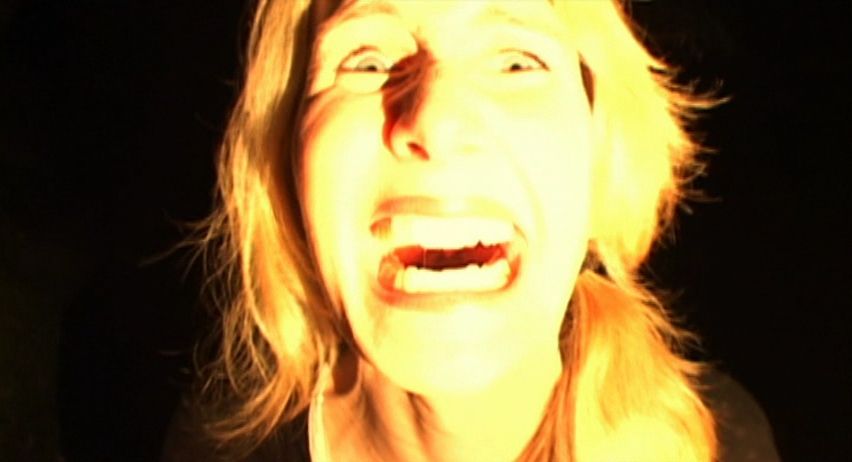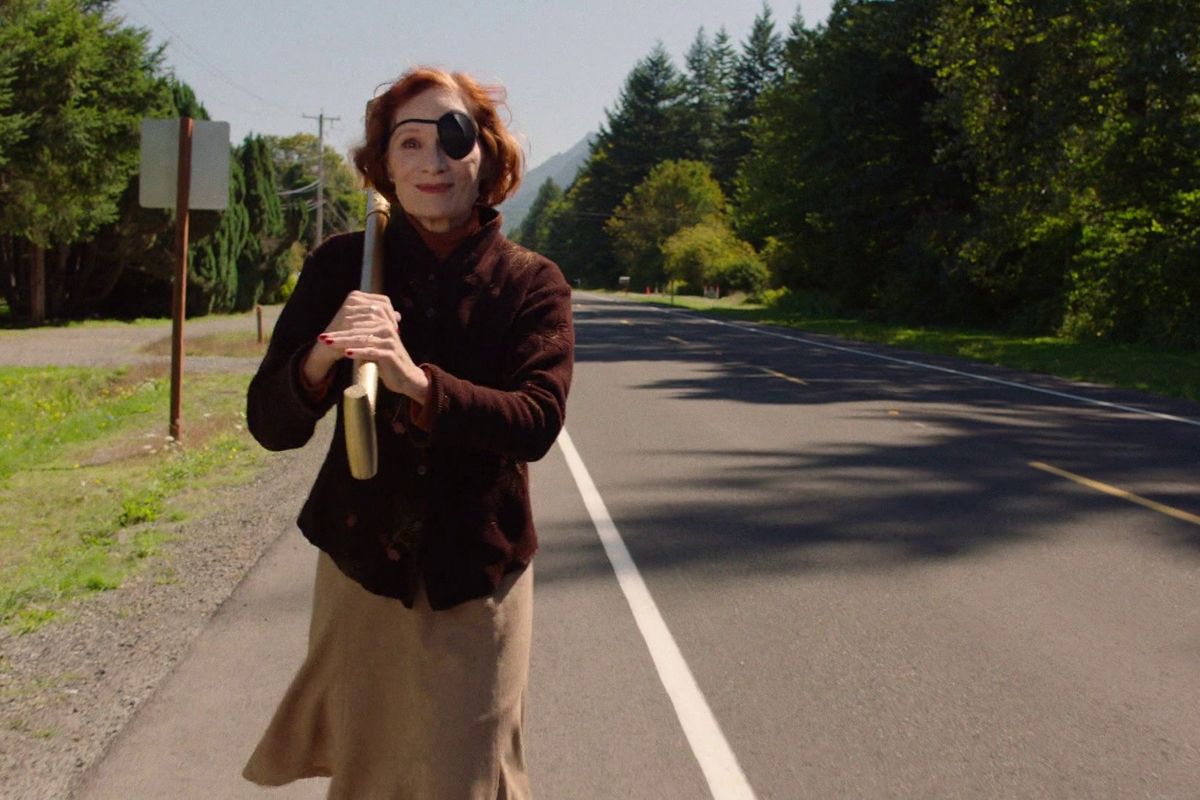I Finally Watched Twin Peaks! All Of It!

One of the most atypically didactic scenes in the entire Twin Peaks saga comes early into the movie Fire Walk With Me. The film's director David Lynch, as FBI Deputy Director Gordon Cole, directs the attention of two agents towards a woman doing a bizarre interpretive dance in a red dress and clown make-up. Cole himself holds his fingers over his face while telling them she’s “his mother’s sister’s girl.” Oh, that Lynch! So wacky, right? But later, the elder agent (Chris Isaak) asks his new partner (Keifer Sutherland) if he was paying attention, revealing what each detail signified about their case. For instance, “mother’s sister’s girl” with the fingers over the face? That meant the sheriff’s uncle was in prison! That info we got from the Lynch’s mouth wasn’t just eccentric whimsy, but intentional, complex code. There are rewards to paying attention, you see! He knows exactly what he's doing.
Ironically, this scene shouldn’t even be in the movie. Peaks star Kyle MacLachlan, eager to avoid typecasting and upset at how Lynch and co-creator Mark Frost had abandoned the cast during the second, and seemingly final, season, didn’t want to be in Fire Walks With Me at all. While he did sign on, he would only do a brief number of scenes. So rather than having his Agent Cooper in the opening sequence, Chris Isaak was brought in to play Agent Chester Desmond, never to be seen in the show's narrative again, as he was only there to stand in for the show’s annoyed lead. With the central thrust of Fire Walk With Me involving the seven days before Laura Palmer’s death, the Chester Desmond prologue might have been removed altogether. But it wasn't. Maybe the pre-production had already begun, or Frost thought the sequence was key to the show’s mythology, or Lynch really wanted to film that the clown scene or the bit where Isaak makes Sutherland spill his coffee. The audience gets a long extended sequence mostly irrelevant to what follows, featuring characters created out of behind-the-scenes necessity, while the director himself appears on screen to tell us everything is intentional, however peculiar. An admonishment few fans would dream of challenging.

When I saw Lynch's much anticipated Mulholland Dr on campus in college - late '01 or early '02 - I knew it had originally been as a TV pilot and then reshaped for cinematic release. What followed, while interesting, sure felt like a TV pilot, subplots and all, until the camera zoomed into a box and, pop! We were in a new reality where almost every single actor was trotted out again in a new role, the story now aggressively centered around Naomi Watts’ psychologically struggling actress. I couldn’t believe it. Did Lynch really resolve his pilot by saying it was all a dream? We’re supposed to believe Watts’ character had dreamt multiple storylines, including a mob caper, unable to deal with her miserable reality? I argued with friends outside the screening room, passerby occasionally chiming in with either similar confusion or confidence in the director, as I tried to make clear I was discussing my disappointment with the movie on a formal level that went beyond mere interpretation. Online research later confirmed my suspicion that Lynch hadn’t really reshaped the pilot to fit his new ending, let alone known how the story would resolve. He simply added a nude love scene (to Laura Harring’s understandable unease - she'd signed on for an ABC show!) and an extended Wizard Of Oz ending (“and you were there, and you were there, and the silent cowboy was there…”) after financiers said they’d fund production of an ending and release the pilot cinematically if he could write it up (no idea if the producers demanded nudity, but they wouldn't be the first). This was - factually - not some elegant auteurist vision. This was the retroactive recovery of a pilot filmed in 1999 with a sequence filmed almost two years later, the events now “open to interpretation.” Lynch says he believes this is how the fates always planned it, but I’ve yet to see a euphoric review give it up for the fates. Or even admit the fates had the steering wheel. Everyone from Sight & Sound to Roger Ebert to you, probably, was happy to treat the product as an inexplicable enigma of rich mystery rather than the producer-requested repo job the director has literally admitted it is. And I’ve been Mugatu screaming “I feel like I’m taking crazy pills!” ever since.
I don’t remember if I saw Fire Walk With Me a little before or a little after Mulholland Dr, but I’d guess after, because I came in cranky, cranky, cranky. I’m not sure whether my pals had already seen the series, but they showed a proper, hushed respect befitting late Gen X college students. I was completely green to the franchise, though, and growling even before David Bowie showed up with a southern accent. Homey didn't play that. (Apparently, neither did Bowie.)
Despite all this hogwash, I still considered myself a Lynch fan! I’d always loved Blue Velvet (I think I taped it off HBO as a teenager!), liked the Elephant Man, and was blown away when I belatedly saw Eraserhead as a video store clerk. Between that and 2006's self-produced 3-hour magical misery tour INLAND EMPIRE, my new perspective was that I liked my Lynch gangsta. None of this tv pilot shit. Raw and uncut. Devoid of commercial strictures. I even suspected that INLAND EMPIRE might have been Lynch trying to make the “dream logic” headtrip those benighted (and stupid! stupid! stupid!) critics had assumed Mulholland Dr was. No wonder he focused on selling merch for a decade after EMPIRE got considerably less shine than that fucking pilot. You'd ingore that dense rollercoaster but hail a TV pilot with a Wizard Of Oz ending?! That's basically Lost, you fools! How do you not see?! I feel like I'm the female lead in a David Lynch film!

The cult of Twin Peaks didn't stop looking like it was having fun, though, and when my then-wife received a DVD screener of the unexpected, planet-delighting 2017 season 3 from Showtime, I decided to check out the pilot again (I know I tried once on VHS and once on DVD in the years past, but remained too cranky to go further). This time, putting myself in the shoes of someone gobsmacked to see any degree of Lynch up against Cheers in the summer of 1990, I loved it. I even made it a good way into season 2 before I decided parenting a toddler was dream logic enough for now.
Flash-forward to summer 2022, where I found myself with two weeks of solo staycation as the kid went off with his mom to the east coast. Suddenly, it hit me: it was time to binge Twin Peaks. All of it. The pilot, the two seasons, the prequel, the return. I’d spent twenty years with challenging opinions held from a distance. It was time to immerse, and finally solidify The Take.
Watching the show with the lights off, the phone down, and the pad quiet, a young twentysomething who saw RIGHT THROUGH Mulholland Dr was now a fortysomething who couldn’t even tell you when he’d bet Lynch & Frost were busy taking meetings instead of assuring the cast they didn’t look like Grade-A goofballs. Or rather, I didn’t care. I had completely fallen in love with Agent Cooper as Lynch’s fantasy of his best self: a screwball not just harmless, but exceptionally helpful. A man who could make mysticism sound as wholesome as apple pie, embracing not just our collective humanity but accepting the magical, terrifying dimensions beyond it. The nerds were right, this isn't a TV show. But it isn't a movie either. It's an epic ad for transcendental meditation. And tight sweaters. And coffee. And I was sold.
Oh, wait. The plot. I almost forgot there's an outside chance someone is reading this without long-held opinions of their own about Twin Peaks! The show is basically Peyton Place in the Pacific Northwest, where the murder of a high school beauty queen named Laura Palmer reveals the dark, ugly underbelly of a cozy logging & tourism community. The FBI comes to town, usually a source of static with local fuzz, only Kyle MacLachlan’s Agent Cooper is so ingratiating, so serene, so intelligent, so enthusiastic and so accepting that within days not one cop has an issue when he’s throwing rocks at glass bottles as suspects’ names are shouted at him. That’s how you let your subconscious instincts speak up, you see!

Surrounding Lynch’s delightful dream of himself is a collection of local oddballs, smoking hot classmates of Palmer's, scheming businessmen and…well, spooky spirits. It’s not long before Cooper’s having visions about dark netherworlds hidden deep in the woods, with reason to believe Laura, her murderer and anybody one degree from either may have been possessed by an evil presence. No spoilers, but the central mystery is resolved suddenly in the middle of season 2, which rather hurt ratings despite the introduction of Heather Graham and Billy Zane to the cast for new romantic subplots. Lynch and Frost apparently annoyed much of the cast by being AWOL during this period, returning for one heck of a dark season finale they hoped would right the ship. Despite that whambang cliffhanger, ABC decided the goose that layed a golden egg in Summer ’90 was dead by Summer ’91. Fans of Northwestern quirk settled for CBS’s Northern Exposure (a surprisingly wholesome missing link between Twin Peaks-mania and Seinfeld-mania about a young, sarcastic Jewish doctor sent from New York to rural Alaska). Fans of Lynch settled for promises of a film prequel (they also got lots of goofy Lynch homages in arthouses until Quentin Tarantino made swearing while holding guns sideways look cooler).
Twin Peaks: Fire Walks With Me (meant to be the first of three Twin Peaks movies!) got booed at Cannes and dumped at the box office. That probably has something to do with the movie mostly recounting the horrifying week Laura Palmer experienced before her murder, the facts of which were thoroughly familiar to fans who memorized the series on VHS or bought the tie-in books by Lynch's daughter and Frost's brother. Later generations had an easier time appreciating the film for what it is (aside from the extended FBI sequences): Lynch centering the narrative on Palmer’s experience and letting Sheryl Lee - a local actress just meant to play a corpse before Lynch realized she could really be his Helen Of Troy - convey the terror of being the deadest girl in Dead Girl Town. Negative reviews found it plodding and mundane, crying “tell me something I don’t already know!” But Lynch was telling them something new. The info just made them feel like shit about laughing at the Log Lady and sure didn't make them scream “now do a sequel!” The deal for more movies was scrapped, and that was that for decades.
One of the last bits in the initial chronology involves an aged Agent Cooper sitting in The Red Room (where demons take coffee breaks or something), told by Laura Palmer that she’ll see him again in twenty five years. I’m not entirely sure what Lynch’s goal was there. Maybe he was just chucking pebbles and following the fates again. But twenty five years after that scene aired, Hollywood was full of streaming sites hungry for content and positively horny for existing intellectual property. Not only was it worthwhile to rope together the surviving cast for a new season of Twin Peaks, there wasn't a commercial downside to giving Lynch his craved final cut. Ad sales, schmad sales: the new goal in TV was getting every nerd that gave a shit about a revived franchise to sign up for a site's free trial. In 2017, Showtime aired 18 new episodes of Twin Peaks (they'd only asked for 9 but didn't have anything better to show anyway), every single one directed by Lynch. And in 2022, I finally watched the fucker.

Irrespective of quality, I’m glad this uncut Lynch funk was an outcome of the streaming boom. For all the cultural context in its initial novelty (the show was on against Cheers re-runs!), the story and Lynch's work has an allure far beyond its era. As much as people hate to admit it, many of Lynch’s dalliances with Hollywood are rife with the tension of a proudly muse-driven craftsman apt to check out if an exec gives him too many suggestions. So I’m glad that, in his 70s, Lynch got to take his most enduring pop product and pop off. These 18 hours easily could have been cut to 9 in terms of "story." But if the dude wants to include every little joke or cameo (Michael Cera, I love you) or baffling bit of mob violence (Jennifer Jason Leigh, I love you) that tickles his mind-pickle, let him! He’s earned it! Sure, there were excruciatingly repetitive storylines containing multiple "Lynch knows the viewer knows that Lynch knows" bits where characters wait impatiently for someone to leave the room so the plot can get moving. Sure, sometimes an entire episode would play like an almost entirely unrelated short film. But nobody’s gonna cancel their subscription over it. So let a player play!
Well, if you’re a Showtime exec. As for the rest of us, I think there’s plenty to grumble about. I’ve never liked how Lynch treats disability and deformity. While he could hypothetically be credited for employing a broader spectrum of bodies than we usually see on screen, the characters who get to have inner lives tend to be portrayed by beautiful movie stars and waspy supporting actors, the "weird" getting to signify "weird." Lynch would probably be cooler with featuring my microtia on camera than most directors, but I bet my ear would have more close-ups than I’d have lines. Don’t take it from me, though. Here’s Peter Dinklage in the 1995 classic Living In Oblivion, Tom DiCillo’s hilarious self-flagellation for having made the Lynch homage Johnny Suede in 1991.
In Twin Peaks: The Return, the little person that let viewers know they'd arrived in weirdsville is replaced by a bare, skinny tree with a huge booger on it, as Michael J. Anderson wanted too much money and was saying some truly nasty stuff about Lynch on Facebook. The giant and the one-armed man were apparently less trouble to bring back, though. And while I loved that Sherilyn Fenn's once angelic Audrey Horne was now inexplicably trapped in an endless, impotent argument with her unfazeable, matter-of-fact husband, did he have to be played by a victim of juvenile rheumatoid arthritis? No shame on Clark Middleton's performance - I'm forever available to do a scene with Sherilyn Fenn on 18 hours notice, myself - but the choice to make the sequence's "why is she with him?" humor explicitly physical is a tired-ass cliche we rightly call out when provided by, like, the Farrellys.
The "Dougie" storyline was even more torturous, with scene after scene after scene of Agent Cooper basically doing Chauncey Gardner on ludes and nobody seeming to notice. I'm sure there was some point to it all, but that doesn't make it enjoyable to watch what's basically a supernatural stroke victim trudging through a cornball comedy plot for a cumulative amount of time far longer than any Happy Madison film. A metaphor does not a 10-episode arc involving Jim Belushi justify.

Lynch wouldn’t be the first surrealist auteur to get a pass on indulgent cornball, though. Watching Luis Bunuel’s The Phantom Of Liberty as a video store clerk around the time of INLAND EMPIRE, I was struck how long it would take ol' Loobie to make some self-impressed joke about the cinematic medium or modern society that the Zucker Brothers would just toss out in the background of a broader set piece. For all the chatter about what Twin Peaks says about America, using Dr. Jacoby to sock it to extremist podcasts hawking dubious products isn't exactly material untapped by umpteen other comedies. Watching the decades-in-the-making BOB storyline climax with a “superhero” battle between a new character and an evil volleyball, I had to wonder how this winking at Hollywood cliche is an admirable use of multi-million dollar carte blanche, rather than a wearier version of what David Wain or any Adult Swimmer gets up to. Is satire only impressive when we’re primed to conceive of it that way, undistracted by actual amusement? And was the choice to end Season 3 with suggestions of a multiverse even satire in the first place?
Mark Frost is usually happy to explain the sci-fi logic of what you’re seeing on Twin Peaks, publishing “dossiers” before and after the last season aired. But for all his labor, fragile cineastes only plug their ears and pretend Lynch doesn’t type it all up with this Hill Street Blues alumni who also co-wrote the ‘00s Fantastic Four movies. “In my book, you see that the observatory was created in 1941, when..." "The story is there is no story! Lalalalala!” To be fair, Lynch might be yelling that at Frost sometimes, too.

I’m utterly embarrassed by anyone who tries to argue that Twin Peaks: The Return is a movie, especially those brown-nosers at Sight & Sound. I dare you to attempt a non-qualitative argument for why season 3 is a movie and not season 2 or True Detective or And Just Like That. Qualitative arguments are a trip, too: using the term "film" as an honor for great work is hilarious almost forty years after Screwballs. But I’m not aggrieved by someone simply enjoying or appreciating a massive chunk of indulgent, surreal filmmaking like this anymore. The most respectable review of Mulholland Dr I ever heard was from my friend Greg, owner of the local record shop: “I like movies where you find a dead body…and it’s you.” After hours of debating my peers, it was a delight and a relief for someone to explain what they enjoyed rather than assure me there's more going on than we realize.
For all my compulsion to undercut if not humiliate those bloviating about these treasures in a vacuum, unable to acknowledge Lynch takes notes and makes compromises just like JJ Abrams or anybody else who’s had an office at ABC, big-budget auteurist surrealism is indeed a rare treasure. And with The Return, Lynch really got to do it! The scenes of Lynch doing deaf guy jokes and ogling pretty ladies as Deputy Director Cole are there purely out of artistic impulse, just like his phenomenal sound editing and enduring love of Au Revoir Simone. I still hate how idealist cinemaphiles refuse to conceive of answers to “what the fuck just happened?” that don’t flatter the director. But today, I appreciate how rarely popular filmmaking makes us ask what the fuck just happened.